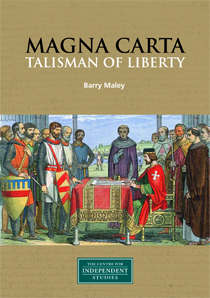
Eight hundred years ago, in 1215, an English king was confronted by rebellious barons – the great landholders of England – who demanded that his royal powers be curbed in favour of their liberties. Their Magna Carta (or ‘Great Charter’) listed their proposals. That singular event became the foundation of a movement that finally brought justice, liberty and prosperity to the common men and women of England; and, in turn, to English-speaking nations elsewhere. Deeper in the pre-medieval history of England there had already existed a combination of customs and forms of government that pre-figured, and underpinned, the coming of the Magna Carta and the growth of parliamentary democracy. At the centre of this achievement is the long delayed coming of democratically decided rule of law. The alternative is the rule of persons and their whims and wishes – and thus the face of tyranny. We Australians justifiably rejoice in a degree of freedom, well-being, prosperity, lawfulness and peace that are the envy of the world. But we rarely stop to consider that our way of life is a creation with a history. Understanding how it came about is vital to the will to protect and to cherish.










